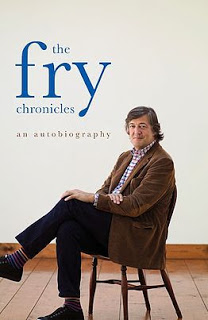
What I got from this book is that Stephen Fry is a very nice man in fairly urgent need of an editor. I collected this book from a pile given away for free on the street, and read it when I ran out of books I’d actively chosen. Keeping a sufficient flow of books arriving sometimes feels like a least a part-time job.
The book covers Fry’s time at university and the first few years afterwards. This is a brief period, but somehow takes 400 pages to tell. This is partly because he has so much success to recount. It is hard not to read this as a story of privilege and victory, as Fry has an agent before he leaves university and is thereafter almost always in work, going from television to West End to journalism.
What cuts the honey is the vinegar of Fry’s sadness. I have heard he suffers from depression, and I can believe it, based on this book. He takes an extraordinarily bleak view of many topics. He deeply romanticises Cambridge and after a long lyrical piece on punting on May mornings, here he is:
Don’t be too hard on them. Suppress the thought that they are all ghastly tosspots who don’t know they’re born, insufferable poseurs in need of a kick and a slap. Have some pity and understanding. They will get that kick and that slap soon enough. After all, look at them now. They are all in their fifties some of them on their third, forth or fifth marriage. Their children despise them. They are alcoholics or recovering alcoholics. Drugs addicts or recovering drug addicts. Their wrinkles, grey, bald, furrowed and fallen faces look back every morning from the mirror, those folds of dying flesh bearing not a trace of the high, joyful and elastic smiles that once lit them. Their lives have been a ruin and a waste. All that bright promise never quite matured into anything that can be looked back on with pride or pleasure. They took that job in the city, that job with merchant bank, stockbroker, law firm, accountancy firm, chemical company, drama Company, publishing company, any company. The light and energy, the passion, fun and faith were soon snuffed out one by one. In the grind of the demanding world their foolish hopeful dreams evaporated like mist in the cruel glare of the morning sun. Sometimes the dreams return to them at night and they are so ashamed, disappointed that they want to kill themselves. Once they laughed and seduced or were seduced, on ancient lawns, under ancient stones and now they hate the young and their music, they snort with contempt at everything strange and new and they have to catch their breath at the top of the stairs.
This is an extraordinarily dark view of life after college, and makes me feel very sad for Fry.
Less sad, more revolting, as if often the case of memoirs on professions that require your parents to have money to (politics, arts, media), is the tinyness of the world involved. The same small set of people are involved from university onwards. This is the UK for you, and I am fairly inured to it by now. Not Fry’s fault of course, and he name drops absolutely as lightly as possible, but still hard to swallow.
